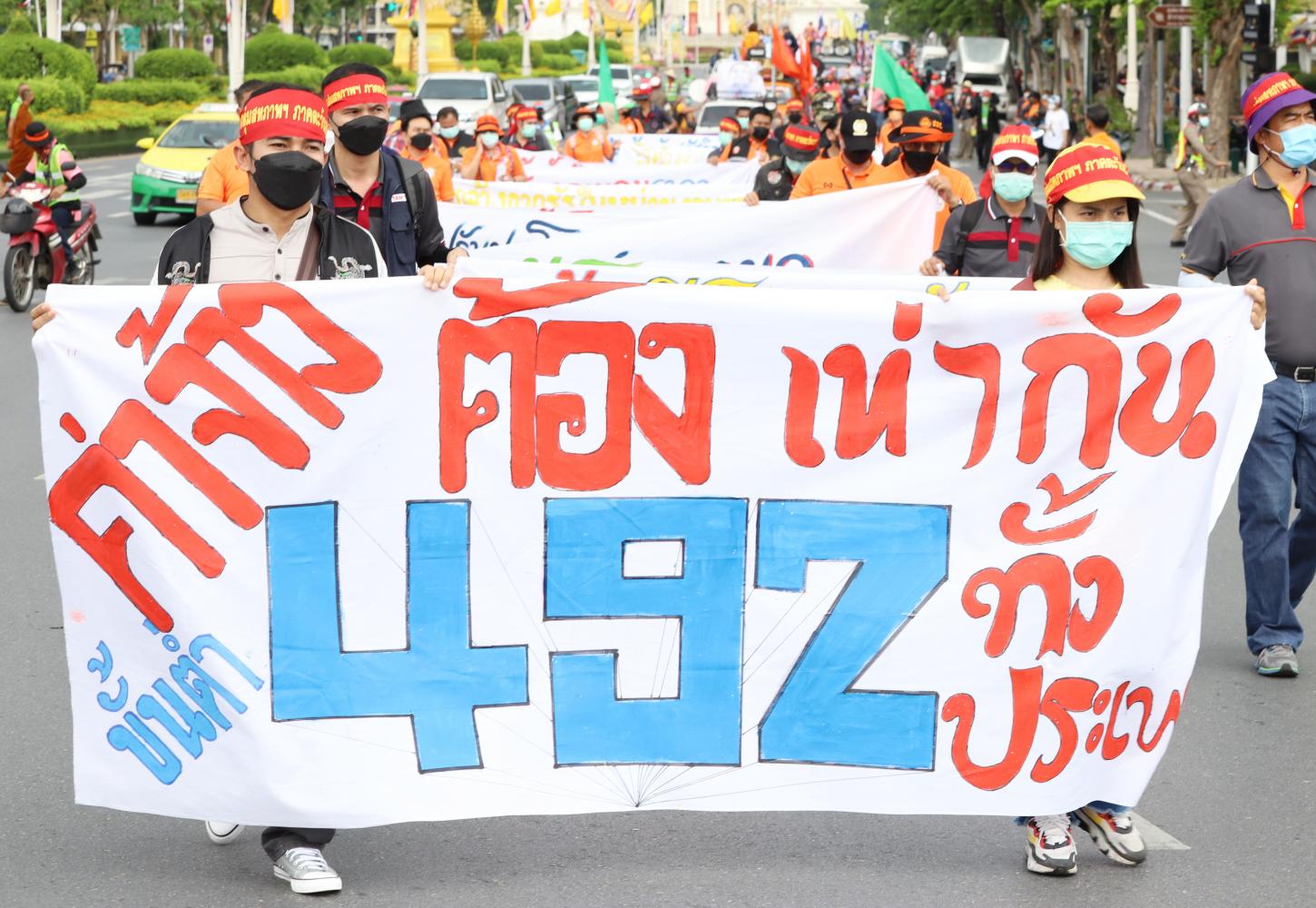Thailand – Explainer: Inside the case for a minimum wage hike
Thai workers are feeling the pinch from months of higher living expenses, leading them to take to the streets on Labour Day to demand a 45% increase in the daily minimum wage.
Some economists and business leaders have pushed back, claiming the burden from such a wage hike would result in higher product costs and inflation.
What are the details of the daily minimum wage increase?
The Thai Labour Solidarity Committee (TLSC) and the State Enterprises Workers’ Relations Confederation have called for a new rate of 492 baht nationwide to ease the hardship of rising living costs.
On Labour Day, workers paraded from Democracy Monument to Government House to urge the government to meet their wage rise demand and improve working conditions.
TLSC leader Sawit Kaewwan said the requested increase is the minimum a family of two needs to earn according to International Labour Organization guidelines.
The two organisations said their survey of workers’ monthly expenses found employees have been spending an average of 6,581 baht on food and transport, as well as 14,771 baht on household expenses such as family support and utility bills.
This means the workers would need a minimum daily wage of 712 baht to sustain themselves and their families. As a result, the organisations said the hike is justified.
Current minimum wages vary depending on the province. The highest is 336 baht per day in Chon Buri and Phuket, while the three southernmost provinces of Narathiwat, Pattani and Yala have the lowest wage of 331.
On Labour Day this past Sunday, workers paraded from Democracy Monument to the Government House to urge the government to meet their wage demand for 492 Baht. (Photo: Apichit Jinakul)
Over the past decade, a minimum wage of 300 baht a day during the Yingluck administration in 2013 was followed by an incremental increase to 310 baht in 2017 and later to 330 baht in 2018.
The last daily wage increases occurred in January 2020, ranging from 313 baht to 336 baht.
What are the implications for businesses?
Nuttanan Wichitaksorn, an economist and visiting research adviser at Thailand Development Research Institute, said while it is sensible to increase the minimum wage when the cost of living increases, the current state of the economy does not support such a move.
“They want a 492-baht minimum wage. I’m not sure what kind of calculation this figure is based on,” said Mr Nuttanan.
“We should have different wages with different raises for different regions — that’s the first concern. Second, Thailand does not have a living wage and when you do not know that level, how can we calculate if 492 baht per day is a fair level?”
There is a difference between a minimum wage and a living wage. The first is determined by law, while the latter is the amount in practice a person needs to earn in order to live and have sufficient funds to pay for necessities such as rent, food and transport without needing handouts, he said.
On Labour Day this past Sunday, workers paraded from Democracy Monument to the Government House to urge the government to meet their wage demand for 492 Baht. (Photo: Apichit Jinakul)
“Increasing the minimum wage during this time will likely hurt the economy more because it will push up the prices of things and affect inflation even more. This would be the scenario even if there was not an economic crisis or any problems,” said Mr Nuttanan.
“Employers and businesses will pass on their cost burdens to consumers. We need to know the living wage. In some countries, they calculate their minimum wage based on the living wage.”
What would be the effects on the exports and tourism sectors?
From an economic perspective, he said the wage increase should be based on productivity. This is easier to measure for the export sector than other segments as businesses can track the amount of goods they are selling.
Another factor is Thailand’s competitiveness in the global market, said Mr Nuttanan.
“If Thailand was not a big player in the export market, we would need to keep prices lower to remain competitive. While Thailand is major food exporter, that doesn’t automatically translate to us having more competitive power over other countries,” he said.
However, it is a different story for the tourism sector, which accounts for almost 20% of the country’s GDP.
“It’s really hard to measure productivity in tourism,” said Mr Nuttanan. “If you increase the price, especially in this environment, it’s similar to exports. We want to be competitive and attract tourists. How long can these businesses continue if the minimum increase is such a big jump from 300-something to 492 baht?”
He suggested keeping a close watch on the unemployment rate if the minimum wage hike happens.
The government needs to calculate trade-offs between requiring companies to pay higher wages and taming inflation, said Mr Nuttanan.
What is the private sector sentiment?
Kriengkrai Thiennukul, chairman of the Federation of Thai Industries, said the domestic economy has not fully recovered from the impact of the pandemic, while the Russia-Ukraine war is adding more pressure this year.
If businesses struggling with the impact of Covid-19 have to increase wages, many of them may be forced to shut down, he said.
Lae Dilokwitthayarat, a labour specialist and economist at Chulalongkorn University, echoed Mr Kriengkrai and said businesses see employees as costs that need to be kept low, while workers demand living wages to match the rising costs of living.
In terms of solutions, Mr Kriengkrai and Mr Lae both suggested the government should step in.
Mr Kriengkrai proposed increasing the minimum wage gradually when the global economy recovers significantly and Thai businesses, notably those in the tourism sector, get stronger.
Mr Lae argued it is the government’s job to restore workers’ dignity by guaranteeing their income if current wages are inadequate.
When would a minimum wage increase happen?
Permanent labour secretary Boonchob Suttamanaswong said a committee comprising labour, business and government representatives has begun reviewing the minimum wage and is expected make a decision on an increase in August or September.
However, Labour Minister Suchart Chomklin reiterated this past Sunday the government’s rejection of a nationwide minimum daily wage increase to 492 baht.
“The minimum wage will no doubt be increased. But the new rate has to be supportive of employers’ businesses as well as keep employees happy,” he said.
Source: https://www.bangkokpost.com/business/2304394/explainer-inside-the-case-for-a-minimum-wage-hike


 Thailand
Thailand






